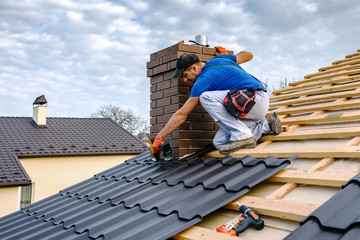Roofing Company plays a crucial role in the construction and maintenance of residential, commercial, and industrial properties. Its primary focus is on the installation, repair, and replacement of roofs, ensuring that buildings remain structurally sound and protected from the elements. The work requires a combination of technical expertise, skilled labor, and a thorough understanding of various roofing materials and techniques.
Many roofing companies offer a range of services, from new roof installations to routine maintenance, inspections, and emergency repairs. Given the importance of a well-maintained roof, property owners often rely on experienced professionals to handle their roofing needs efficiently and effectively.
One of the most important aspects of a roofing company’s work is the selection of materials. Various roofing options are available, each with its advantages and disadvantages. Some of the most common materials include asphalt shingles, metal roofing, clay or concrete tiles, and synthetic alternatives. The choice of material depends on factors such as climate, budget, durability, and aesthetic preference. Roofing professionals assess these factors and provide recommendations to clients based on their specific requirements. Proper material selection ensures longevity, energy efficiency, and overall structural integrity.
The installation process is another critical function of a roofing company. A properly installed roof serves as the first line of defense against weather conditions such as rain, snow, wind, and extreme temperatures. Installation involves several steps, including preparing the roof deck, applying underlayment for added protection, and securing the roofing material in place. Roofing professionals use specialized tools and equipment to ensure precise and secure installations. Additionally, ventilation and insulation considerations play a role in maintaining indoor comfort and preventing issues such as mold growth and heat buildup.
Routine maintenance and inspections are essential services provided by roofing companies. Over time, roofs are subjected to wear and tear, which can lead to leaks, cracks, and other forms of damage. Regular inspections help identify potential issues before they escalate into costly repairs. Roofing experts examine shingles, flashing, gutters, and other components to detect signs of deterioration. Preventative maintenance, such as cleaning gutters and sealing minor cracks, extends the lifespan of a roof and reduces the likelihood of unexpected problems.
Roof repairs are a common service requested by property owners. Damage can occur due to various reasons, including severe weather conditions, falling debris, or improper installation. Roofing companies respond to repair needs promptly to prevent further structural damage. Repairs may involve replacing damaged shingles, fixing leaks, or reinforcing weakened areas. Skilled roofers use their expertise to assess the extent of damage and implement effective solutions. Emergency repair services are particularly valuable when immediate action is required to prevent water infiltration or safety hazards.
In some cases, a full roof replacement is necessary, especially when the existing roof has reached the end of its lifespan. A roofing company carefully evaluates the condition of an aging roof and advises clients on the best course of action. Replacing a roof is a significant investment, but it enhances a property’s value, improves energy efficiency, and provides long-term protection. During a replacement project, old materials are removed, and new roofing is installed according to industry standards and local regulations. A well-executed replacement ensures durability and enhances the overall appearance of a building.
Safety is a top priority in the roofing industry. Working at heights presents inherent risks, making it essential for roofing professionals to follow strict safety protocols. Companies invest in training, protective gear, and secure equipment to minimize accidents and injuries. Roofers use harnesses, scaffolding, and safety lines to maintain stability while working on steep or elevated surfaces. Adhering to safety regulations not only protects workers but also ensures quality workmanship and reliable outcomes for clients.
In addition to technical expertise, customer service plays a vital role in a roofing company’s success. Clear communication, transparency, and reliability contribute to positive client experiences. Roofing professionals take the time to educate property owners about their options, provide detailed estimates, and address any concerns. Building trust with customers fosters long-term relationships and leads to repeat business and referrals. Many roofing companies also offer warranties on their work, providing clients with peace of mind regarding the durability of their roofs.
Sustainability has become an increasingly important consideration in the roofing industry. Many property owners seek eco-friendly roofing solutions that reduce environmental impact and improve energy efficiency. Some roofing companies specialize in sustainable practices, such as installing reflective roofing materials that reduce heat absorption, using recycled materials, or incorporating green roofing systems. These initiatives contribute to environmental conservation while also helping clients lower energy costs and enhance indoor comfort.
Advancements in roofing technology continue to shape the industry. Innovations such as drone inspections, thermal imaging, and digital modeling have improved the efficiency and accuracy of roofing assessments. Roofing companies leverage technology to streamline operations, provide accurate measurements, and enhance project planning. These advancements not only benefit contractors but also ensure that clients receive precise evaluations and cost-effective solutions.
Choosing a reputable roofing company is essential for property owners looking to invest in roof installation, repair, or maintenance. Researching a company’s credentials, reading customer reviews, and requesting references help determine reliability and expertise. Licensed and insured roofing professionals provide assurance that work will be completed according to industry standards. A well-established roofing company prioritizes quality craftsmanship, customer satisfaction, and long-term performance.
The demand for roofing services remains consistent as buildings require regular upkeep to withstand changing weather conditions and environmental factors. Roofing companies play a crucial role in ensuring that properties remain safe, functional, and aesthetically pleasing. Their expertise extends beyond installation and repairs to include maintenance, inspections, and innovative solutions tailored to clients’ needs. As the industry evolves, roofing professionals continue to adapt to new materials, technologies, and sustainability trends, reinforcing their commitment to excellence in construction and property protection.



